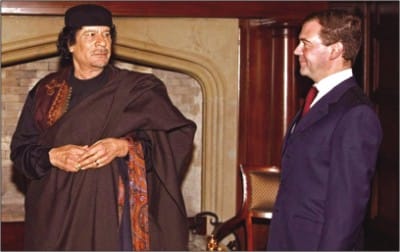Significance of Gaddafi's visit to Moscow

Colonel Muammar el-Gaddafi, the leader of Libya, visited Moscow on 1-2 November. The visit of the Libyan leader was his first visit to Russia since 1985, a trip that could revive close cooperation between Tripoli and Cold War ally Moscow.
It is noted that the visit was just two months after Secretary of State Condoleezza Rice was his guest in Libya. Gaddafi, whom President Ronald Reagan once famously called "the mad dog of the Middle East," is well on his way to mending ties with the United States and other Western governments after renouncing terrorism and efforts to build weapons of mass destruction.
Recently, Libya has paid $1.5bn into a US compensation fund for relatives of victims of terror attacks blamed on Tripoli. The fund was agreed upon in August to settle remaining lawsuits in the US. The attacks include the 1988 Lockerbie bombing that killed 270 people and the 1986 bombing of a Berlin disco, which killed three and wounded more than 200. According to the deal, Libya did not accept responsibility for the attacks, but agreed to compensate victims.
The Libyan leader believes that despite numerous Libyan attempts to amend bilateral relations, the Bush administration has not been in a hurry to fully embrace Colonel Gaddafi and adopted a policy of "wait and see" how Libya conducts its policy in international affairs.
Strategic importance of the visit
The trip to Moscow has gained Libya, the former ally, strategic importance in terms of energy cooperation, and military and civil nuclear cooperation. Libya was an ally of the Soviet Union, but relations withered after the 1991 Soviet collapse. Gaddafi's visit highlights Russia's efforts to bolster relations again.
During the visit, the Libyan leader had dinner with President Dmitry Medvedev at the Russian leader's residence.
"Unfortunately, in the past our relations have been mainly focused on military and diplomatic contacts and there was virtually no cooperation in civilian sectors," the Libyan leader said at a Kremlin meeting with President Dmitri Medvedev. "I believe that such cooperation is especially important in the current conditions."
Gaddafi pitched a Bedouin tent in a Kremlin garden and invited Prime Minister Vladimir Putin for tea.
In the part of Gaddafi's meeting with Putin shown on Russian television, the two sat in leather armchairs beside a bonfire, heedless of the cold autumn wind. "We're becoming closer and closer," Putin said.
"We've discussed a series of strategic questions," Putin said. Gaddafi said, according to the Interfax news agency, "We think alike about gas and oil policies."
"Libya wants to say, 'Look, we have options,' " said Alex Turkeltaub, a managing director at Frontier Strategy Group, a risk consultancy firm. "This is a shot across the bow to the new administration in Washington."
Energy cooperation
Russia has been eager to persuade Libya to back its plans for a gas cartel that would also involve Algeria, Iran, Qatar and the countries of Central Asia and could strengthen Moscow's energy leverage over Europe.
Russian energy companies have been offering Libya sweeping cooperation and investment programs. In a bold offer in July, for example, Gazprom, the Russian natural gas monopoly, offered to buy all of Libya's natural gas production in a deal that could help Gazprom corner the European natural gas market. Libya has been noncommittal.
Now, apparently in an effort to sweeten the deal with something the Untied States would be unlikely to offer, Russian authorities are negotiating to provide Libya with a civilian nuclear research reactor, though it was reportedly unclear whether the sides reached a deal on this issue.
His visit followed a long courtship by Gazprom, the world's largest natural gas company, and the supplier of about 40 percent of the European Union's gas imports.
For now, the North African nations of Libya and Algeria compete with Russia to supply gas to southern Europe. But Russia is toying with forming an OPEC-style group, the Gas Exporting Countries Forum, to eliminate this competition.
At the same time, Gazprom has been buying licenses to Libyan gas fields in joint ventures with the Italian company Eni and Wintershall of Germany. Both companies traded Libyan licenses for access to coveted reserves in Russia, in a sign of how highly Russia prizes the prospect of an energy alliance with Libya. Gaddafi seemed to embrace the idea of closer commercial ties.
Military and nuclear cooperation
Tripoli bought many of its arms from Moscow during the Cold War, which was still raging when Gaddafi last visited 23 years ago.
Military deals were not forgotten, however. Interfax, citing unidentified Kremlin sources, said the Libyans were in talks to buy $2 billion worth of anti-aircraft missiles (S-300 and Tor-M1 surface-to-air missile systems), fighter jets (SSu-30 and Mig-29 fighter jets), helicopters, tanks (T-90 battle tanks) and a diesel submarine.
Libya might also offer to host a Russian naval base on its Mediterranean coastline, a move likely to alarm the West, a Russian newspaper reported. For Russia, a Mediterranean base would cement its military resurgence after it dispatched a flotilla of warships in a show of might last month. The ships stopped in Tripoli this month and are due to continue to Venezuela.
The Russian military presence will be a guarantee of non-aggression against Libya from the United States.
Talks also touched on "the peaceful atom," the Kremlin official said on condition of anonymity, following previous reports that Russia was in talks about building a nuclear power plant in Libya.
Libyan leader Muammar Gaddafi is keen to expand cooperation with Russia beyond the military and political sphere into trade and commerce and invited Russian investment and business to his country.
Observers say that the visit suggested that Gaddafi, an astute politician, is manoeuvring to play Russia and the United States against each other for commercial and political favours.

 For all latest news, follow The Daily Star's Google News channel.
For all latest news, follow The Daily Star's Google News channel. 



Comments